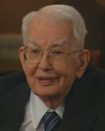New Media | 01 de agosto de 2001 | Vistas: 1421
During this interview, audiences may learn about the early beginnings and academic years of whom later became a Nobel Prize in Economic Science winner, Ronald H. Coase.
A broad number of subjects are discussed, involving the intellectual activities he carried out, ranging from his interest in economics and law, his transition from socialism up to the various publications and theories laid out by him.
The interlocutors converse on the hows and whys of his analyses, providing insights on key terms like business firms, transaction costs, externalities, durable goods and future periods, which lead him to write articles such as "The Nature of the Firm", "Durability and Monopoly", "The Lighthouse in Economics", among many others, as well as "The Problem of Social Cost", which was considered to be the basis of what is known as the Coase theorem.
The interview concludes in his own Coasean pragmatic and realistic manner, as he advises economists to focus on the solutions of the existing real life problems.


Ronald H. Coase (1910-2013) was an economist, author of the 1937…
Nuestra misión es la enseñanza y difusión de los principios éticos, jurídicos y económicos de una sociedad de personas libres y responsables.
Universidad Francisco Marroquín